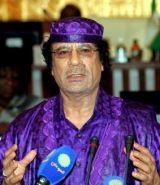Libya turns from terror to promoting peace in Darfur
October 21, 2007 (UNITED NATIONS) — Once a pariah state promoting terrorist acts and seeking nuclear weapons, Libya in recent years has turned to promoting peace in Africa and diplomatic efforts to resolve the continent’s wars, including the Darfur conflict.
 The north African nation just won a seat on the powerful U.N. Security Council without any U.S. opposition, but there are still concerns about its past and present ambitions and many inside and outside the U.N. will be watching closely.
The north African nation just won a seat on the powerful U.N. Security Council without any U.S. opposition, but there are still concerns about its past and present ambitions and many inside and outside the U.N. will be watching closely.
Families of many victims of the 1988 bombing of Pan Am Flight 103 over Lockerbie, Scotland, criticized the United States for refusing to support a rival African country to run against Libya, which officially accepted responsibility for the terrorist act in 2003.
Kara Weipz, whose brother was one of the 270 bombing victims, said she was very upset, especially at the United States, for “rewarding (Libya) for more bad behavior.”
But 178 countries in the 192-member U.N. General Assembly voted to put Libya on the Security Council for two years starting Jan. 1, many pointing to its renunciation of weapons of mass destruction and terrorism.
“Libya has changed — it’s not Libya of 20 years ago,” China’s deputy U.N. Ambassador Liu Zhenmin said Friday. “I think they are going to play … an important role especially on issues concerning Arab countries and concerning Middle East and also Africa.”
The United States used its influence to thwart Libya’s attempts to join the 15-member council, which deals with issues of international peace and security, in 1995 and 2000, but not this year.
U.S. deputy ambassador Alejandro Wolff wouldn’t say after Tuesday’s secret ballot how the United States voted. But he said “the world changes” and repeated several times, “We look forward to working with all new members that are elected.”
The U.S. had regarded Libya as a pariah state for decades after Moammar Gadhafi came to power in a military coup in 1969 and turned against the West.
Libya was demonized for sponsoring various terrorist groups as far-flung as the Irish Republican Army and Palestinian factions, and for trying to undermine pro-Western governments in Africa. Libya was also blamed for a West Berlin disco bombing that killed two American soldiers in 1986.
The United States put Libya on a list of state sponsors of terrorism. It imposed sanctions that barred American companies from doing business in the oil-rich nation, and in 1986 U.S. warplanes carried out airstrikes against Libya.
U.S.-Libyan relations started improving in 2003 after Gadhafi’s surprise decision to dismantle Libya’s clandestine nuclear program. That same year, Libya reached a $2.7 billion settlement with families of the victims of the Pan Am bombing, and the next year it paid $170 million compensation to the families of the 170 victims of the 1989 bombing of a French UTA passenger jet.
The United States resuming full diplomatic relations with Libya last year for the first time in more than a quarter-century, and 15 months ago it removed Libya from the State Department’s list of terrorism sponsors.
Libya’s abandonment of nuclear weapons and renunciation of terrorism has led to new efforts by Gadhafi to boost the country’s image in Africa.
Earlier this year, Libya hosted two meetings of rebel groups from Sudan’s conflict-wracked western Darfur region.
Last month, the African Union and the United Nations chose Libya to host peace talks starting Oct. 27 aimed at ending the 4 1/2-year conflict which has killed over 200,000 people and forced over 2.5 million from their homes. U.N. Secretary-General Ban Ki-moon has praised Libya’s “constructive role.”
Libyan Foreign Minister Abdel-Rahman Shalqam said the country’s election to the Security Council “proves the renewed confidence in the pioneering role of Libya and the brother leader of the revolution (Gadhafi) in serving the cause of peace and stability in the world, Africa and the Mediterranean.” The official Al Jamahiriya newspaper said it “is evidence of Libya’s political success in solving the urgent problems in Africa.”
But Jon Alterman, director of the Middle East program at the Washington-based Center for Strategic and International Studies, cautioned Libya’s efforts to remake itself don’t mean the government has addressed all the problems that caused it to be shunned.
While it was once in the “unthinkable category” for eligibility on the Security Council, Libya is now simply a nation “about which lots of countries have concerns.” He likened the shift to “moving from an F grade to a C grade.”
John Bolton, the former U.S. ambassador to the United Nations, said he believes “they have genuinely made a strategic decision that giving up the pursuit of nuclear weapons was a safer course than continuing to go after them.”
Bolton, who dealt extensively with Libya as U.S. undersecretary of state for arms control after it renounced nuclear weapons, said he also believes “they were serious and they wanted to turn toward the United States.”
“My guess is that Libya will fulfill the traditional role of the Arab League member on the council, as Algeria and Qatar did during my time,” he said. “Sometimes that will be helpful to the U.S., and sometimes that will not be helpful to the U.S.”
Weipz, who is President of Victims of Pan Am Flight 103 which represents about 160 families, said she hopes Libya will use its council seat to set an example for other past and present state sponsors of terrorism.
“I want to believe that Libya is out of the terrorism business… I hope they choose to use their position on the Security Council for good things,” she said.
(AP)
